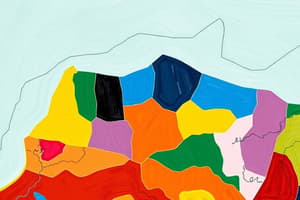Podcast
Questions and Answers
Which of the following are considered the five basic shapes of states?
Which of the following are considered the five basic shapes of states?
- Elongated (correct)
- Compact (correct)
- Landlocked (correct)
- Fragmented (correct)
- Prorupted (correct)
What is a compact state?
What is a compact state?
A state that is small and centralized, making it easier to manage.
What is the greatest advantage of compact states?
What is the greatest advantage of compact states?
They help keep the country together by making communications easier and are easier to defend.
What is a disadvantage of compact states?
What is a disadvantage of compact states?
Which of the following are examples of compact states?
Which of the following are examples of compact states?
What is a prorupted state?
What is a prorupted state?
What are the two principal reasons for proruptions?
What are the two principal reasons for proruptions?
What is the greatest advantage of prorupted states?
What is the greatest advantage of prorupted states?
What are examples of prorupted states?
What are examples of prorupted states?
What is a perforated state?
What is a perforated state?
Which country is an example of a perforated state?
Which country is an example of a perforated state?
What is a fragmented state?
What is a fragmented state?
What separates many portions of a fragmented state?
What separates many portions of a fragmented state?
Which of the following are examples of fragmented states separated by water?
Which of the following are examples of fragmented states separated by water?
Which of the following are examples of fragmented states separated by an intervening state?
Which of the following are examples of fragmented states separated by an intervening state?
What is a disadvantage of fragmented states?
What is a disadvantage of fragmented states?
What is an elongated state?
What is an elongated state?
Which of these are examples of elongated states?
Which of these are examples of elongated states?
What are some disadvantages of elongated states?
What are some disadvantages of elongated states?
What is an advantage of elongated states?
What is an advantage of elongated states?
What is an enclave?
What is an enclave?
Provide an example of an enclave.
Provide an example of an enclave.
What is an exclave?
What is an exclave?
What is an example of an exclave?
What is an example of an exclave?
What is a landlocked state?
What is a landlocked state?
Where are landlocked states most common?
Where are landlocked states most common?
What is a disadvantage of landlocked states?
What is a disadvantage of landlocked states?
Flashcards
Compact State
Compact State
A state with a small, centralized form, promoting easier communication and defense.
Prorupted State
Prorupted State
A state with a projecting extension; often created for resource access or separation.
Elongated State
Elongated State
A state with a long and narrow shape, facing communication and defense difficulties.
Fragmented State
Fragmented State
Signup and view all the flashcards
Landlocked State
Landlocked State
Signup and view all the flashcards
Enclave
Enclave
Signup and view all the flashcards
Exclave
Exclave
Signup and view all the flashcards
Perforated State
Perforated State
Signup and view all the flashcards
Shape of states
Shape of states
Signup and view all the flashcards
Study Notes
Basic Shapes of States
- Five basic shapes: compact, prorupted, elongated, fragmented, landlocked.
Compact States
- Characterized by small and centralized form; governmental proximity to citizens enhances management.
- Advantages include easier communication and defense due to centralized geography.
- May lack natural resources compared to larger states.
- Examples are Poland, Uruguay, and Lesotho.
Prorupted States
- Defined by a long extension that protrudes from the main area.
- Created primarily for resource access (e.g., water) or to separate two neighboring states.
- Advantages include easy coastal access and proximity to local resources.
- Examples include Thailand and Namibia.
Perforated States
- Surrounded entirely by another state.
- Example of this shape is South Africa, which completely encircles Lesotho.
Fragmented States
- Comprise several non-contiguous territories, separated by physical barriers (oceans, lakes, mountains).
- Examples separated by water include Tanzania and Indonesia.
- Examples separated by an intervening state include Angola, Russia, Panama, and India.
- Face challenges such as communication difficulties due to disconnected portions.
Elongated States
- Have a long and narrow shape, which can create unique geographical features.
- Examples include Malawi, Chile, Italy, and The Gambia.
- Disadvantages include difficulties in defense and poor internal communication.
- Advantages encompass diverse landscapes within a single state.
Enclaves and Exclaves
- Enclave: a territory completely surrounded by another state, maintaining political independence (e.g., Vatican City).
- Exclave: a portion of a country isolated from the main territory, surrounded by foreign lands (e.g., Alaska).
Landlocked States
- Defined as states without direct ocean access, fully surrounded by other countries.
- More prevalent in Africa, with 14 out of 54 states being landlocked.
- Disadvantages include limited international trade opportunities due to lack of access to maritime routes.
Studying That Suits You
Use AI to generate personalized quizzes and flashcards to suit your learning preferences.




